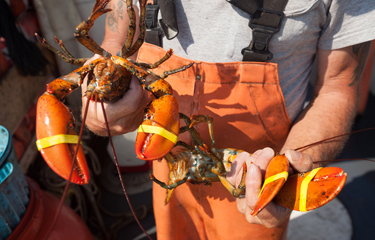NMFS rejects Maine's right whale plan

The National Marine Fisheries Service has informed the Maine Department of Marine Resources (DMR) that its proposed North Atlantic right whale plan, designed to mitigate the impacts the lobster industry may have on the endangered species, doesn’t go far enough.
The plan, which was submitted in January, includes provisions that are intended to help prevent whale entanglements from ropes used by the Maine lobster fishery. The plan included measures such as weak-points in ropes and scaled vertical-line reductions that increase the further from shore – and closer to whale territory – traps are set.
However, a letter sent by NMFS Regional Administrator Michael Pentony to DMR Commissioner Patrick Keliher indicates that NMFS has found that the plan falls short of the steps necessary to reduce risks to whales.
“Reading your proposal and the associated documentation, we note that your own analysis suggests your proposed package of measures will provide no more than a 52 percent reduction in risks to right whales,” the letter reads. “As you know, the TRT’s [Take Reduction Team] framework is intended to achieve a 60-percent risk reduction.”
Because of that gap, NMFS will “be obligated to consider additional measures through our federal rule-making,” the letter states.
What that rule-making entails, Keliher told the Marine Resources Committee, is unclear.
“What that means, we don’t know,” he said, according to the Portland Press Herald. “So there is a lot of work to do still … but they are holding the line at 60 percent.”
The rejection of the plan has frustrated the Maine Lobstermen’s Association – the largest trade group representing the industry in the state. The MLA earlier rejected the plan that the DMR submitted to NMFS, saying that went too far.
“The Maine Lobstermen’s Association is very disappointed that NMFS continues to ignore some of the most pressing human threats to right whales, and that they continue to look solely to the lobster fishery as the whale population continues to decline,” MLA Executive Director Patrice McCarron told SeafoodSource. “We think the DMR plan is very aggressive, and layering more on top of that will result in more hardships for lobstermen, rather than help right whales.”
The issue, McCarron said, is that of all the varied causes of right whale mortality, the only one that is being targeted is the Maine lobster fishery. Vessel strikes, entanglements from other U.S. fisheries, and more have all had proven impacts on right whales, yet the NMFS has not had any proposals for any of those issues.
“Maine is the only state that has proposed anything,” McCarron said. “The agency came back and said ‘Yeah, you’re going to do more,’ but they haven’t proposed a single measure to prevent vessel strikes.”
McCarron said a lot of the frustration stems from the fact that the Maine lobster industry has already been proactive in taking measures to protect right whales, despite the fact that the industry has had no provable impacts on whales. Of entanglement related mortalities for right whales, 75 percent have unknown origins, with no way to determine what gear was involved in the entanglement. Of the 25 percent of entanglements that have known gear, all were industries unrelated to lobster fishing.
“The agency has proof that there are other human activities that are known to be harming right whales. Yet the sole focus is on the lobster industry,” McCarron said. “It is extremely frustrating.”
What the next step will be for the Maine lobster industry, the DMR, and NMFS is unclear. If the federal government enacts new right whale protections, there is a chance the state may not comply, as Maine Governor Janet Mills said in July 2019 that the state would reject an earlier version of the plan, calling it “foolish.”
According to the DMR, the commissioner is set to meet with the Lobster Advisory Council, and until that time, the organization declined to comment any further on the state’s plans.
Photo courtesy of spwidoff/Shutterstock






Share